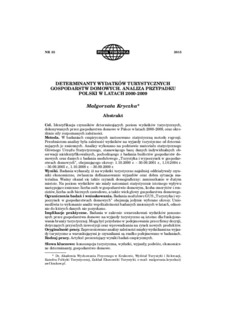| dc.contributor.author | Kryczka, Małgorzata | |
| dc.date.issued | 2015 | |
| dc.identifier.issn | 0867-3888 | pl |
| dc.identifier.issn | 2353-5962 | pl |
| dc.identifier.uri | http://hdl.handle.net/20.500.12053/163 | |
| dc.description.abstract | Celem artykułu jest identyfikacja czynników determinujących poziom wydatków turystycznych, dokonywanych przez gospodarstwa domowe w Polsce w latach 2000-2009, oraz określenie siły rozpoznanych zależności.
W badaniach empirycznych zastosowano statystyczną metodę regresji.
Przedmiotem analizy była zależność wydatków na wyjazdy turystyczne od determinujących je zmiennych. Analizy wykonano na podstawie materiału statystycznego Głównego Urzędu Statystycznego, stanowiącego bazę danych indywidualnych obserwacji nieidentyfikowalnych, pochodzącego z badania budżetów gospodarstw domowych oraz danych z badania modułowego „Turystyka i wypoczynek w gospodarstwach domowych”, obejmującego okresy: 1.10.2000 r. – 30.09.2001 r., 1.10.2004 r. – 30.09.2005 r., 1.10.2008 r. – 30.09.2009 r.
Badania wykazały, iż na wydatki turystyczne najsilniej oddziaływały czynniki
ekonomiczne, zwłaszcza dofinansowanie wyjazdów oraz dobra sytuacja materialna.
Ważny okazał się także czynnik demograficzny: zamieszkanie w dużym
mieście. Na poziom wydatków nie miały natomiast statystycznie istotnego wpływu
następujące zmienne: liczba osób w gospodarstwie domowym, liczba emerytów i rencistów, liczba osób biernych zawodowo, a także wiek głowy gospodarstwa domowego. | pl |
| dc.description.abstract | Purpose. To identify the tourism expenditure determinants made by households in Poland during the years 2000-2009 and the relationship between them.
Method. In the empirical studies regression analysis has been applied. The subject of analysis was the relationship between tourism expenditure and determining variables. The analysis was based on the data published by the Central Statistical Office the following dates: 01/10/2000 – 30/09/2001, 01/10/2004 – 30/09/2005, 01/10/2008 – 30/09/2009.
Findings. The research has shown that economic factors have the greatest impact on tourism expenditure, particularly funding trips and good material situation. An important factor turned out to be demographic in nature: living in a big city (and its implication). The following variables had no significant impact on the level of expenditure: the number of people per household, the number of retirees and pensioners, the number of unemployed, the age of the head of household.
Research and conclusions limitations. The study was based on the data according the GUS (Central Statistical Office in Poland) which only covered a selected period of time. This has prevented analysis of the relationship between the variables during the years for which the data was not obtained.
Practical implications. Studies within the field of the tourism development are crucial for the functioning of the tourism industry. They could also prove beneficial in business decision making in regards to future investments as well as introducing new products to the market. | pl |
| dc.language.iso | pl | pl |
| dc.rights | cc-not | pl |
| dc.source | Folia Turistica 2015, nr 35, s. 167-189 | pl |
| dc.subject | konsumpcja turystyczna | pl |
| dc.subject | wydatki | pl |
| dc.subject | wyjazdy | pl |
| dc.subject | podróże | pl |
| dc.subject | ekonomiczne determinanty | pl |
| dc.subject | gospodarstwo domowe | pl |
| dc.subject | tourism consumption | pl |
| dc.subject | expenditure | pl |
| dc.subject | trips | pl |
| dc.subject | travel | pl |
| dc.subject | economic factors | pl |
| dc.subject | household | pl |
| dc.subject.other | nauki-spoleczne-ekonomia-prawo-administracja | pl |
| dc.subject.other | turystyka-turyzm | pl |
| dc.subject.other | zarzadzanie | pl |
| dc.title | Determinanty wydatków turystycznych gospodarstw domowych. Analiza przypadku Polski w latach 2000-2009 | pl |
| dc.title.alternative | Determinants of Households’ Tourism Expenditure. Case Study Analysis: Poland During the Years 2000-2009 | pl |
| dc.type | Article | pl |
| dc.date.accessioned | 2018-12-03T09:22:42Z | |
| dc.date.available | 2018-12-03T09:22:42Z | |

